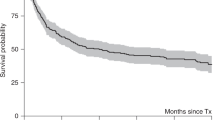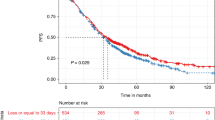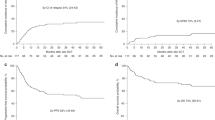Abstract
We assessed the effect standard-dose induction chemotherapy and tandem cycles of high-dose chemotherapy (HDC) have on outcomes in metastatic breast cancer. One hundred and one women with metastatic breast cancer were enrolled in two non-randomized phase II studies. The first group of 64 patients (induction group) received four cycles of docetaxel 75 mg/m2 and doxorubicin 50 mg/m2. The next 37 patients did not receive induction (no induction group). Both groups received two (tandem) cycles of HDC. Blood-derived stem cells were collected after the first HDC cycle, processed using CD34+ cell selection and then reinfused after the second HDC cycle. Outcomes were compared between the two groups and also to patients participating in the Philadelphia (inter-group) randomized metastatic breast cancer transplant trial (PBT-01). Intent-to-treat analysis revealed no significant differences in complete response rates (37.5% vs 27%; P = 0.20), overall response (75% vs71%), median progression free survival (PFS) (11.9 vs 8 months; P = 0.24) and overall survival (OS) (<36 vs 25 months; P = 0.16), in the induction vsno induction groups, respectively. Adjusting for differences in known baseline characteristics, induction group patients were found to have significantly longer PFS (P = 0.002), OS (P = 0.01) and more frequent conversion from a partial to complete response (58% vs ⩽13%, P ⩽ 0.0002) when compared with PBT-01 patients. Induction chemotherapy administered prior to tandem cycles of HDC does not appear to adversely affect outcomes in metastatic breast cancer patients. Outcomes in our induction group also compare favorably with those observed in PBT-01 and warrant further clinical investigation. Bone Marrow Transplantation (2001) 27, 1245–1253.
This is a preview of subscription content, access via your institution
Access options
Subscribe to this journal
Receive 12 print issues and online access
$259.00 per year
only $21.58 per issue
Buy this article
- Purchase on Springer Link
- Instant access to full article PDF
Prices may be subject to local taxes which are calculated during checkout


Similar content being viewed by others
References
Greenberg PA, Hortobagyi GN, Smith TL et al. Long-term follow-up of patients with complete remission following combination chemotherapy for metastatic breast cancer J Clin Oncol 1996 14: 2197–2205
Sparano JA, O'Neill A, Schaeffer PL et al. Phase II trial of doxorubicin and docetaxel plus granulocyte colony-stimulating factor in metastatic breast cancer: Eastern Cooperative Oncology Group study E1196 J Clin Oncol 2000 18: 2369–2377
Gianni L, Muzone E, Capri G et al. Paclitaxel by 3-hour infusion in combination with bolus doxorubicin in women with untreated metastatic breast cancer: high antitumor efficacy and cardiac effects in a dose-finding and sequence-finding study J Clin Oncol 1995 13: 2688–2699
Antman K, Ayash L, Elias A et al. A phase II study of high-dose cyclophosphamide, thiotepa and carboplatin with autologous marrow support in women with measurable advanced breast cancer responding to standard-dose therapy J Clin Oncol 1992 10: 102–110
Williams SF, Gilewski T, Mick R et al. High-dose consolidation dose therapy with autologous stem-cell rescue in stage IV breast cancer: follow-up report J Clin Oncol 1992 10: 1743–1747
Stadtmauer EA, O'Neill A, Goldstein LJ et al. Conventional-dose chemotherapy compared with high-dose chemotherapy plus autologous hematopoietic stem-cell transplantation for metastatic breast cancer New Engl J Med 2000 342: 1069–1076
Rahman ZU, Frye DK, Buzdar AU et al. Impact of selection process on response rate and long-term survival of potential high-dose chemotherapy candidates treated with standard-dose doxorubicin-containing chemotherapy in patients with metastatic breast cancer J Clin Oncol 1997 15: 3171–3177
Garcia-Carbonero R, Hildago M, Paz-Artes L et al. Patient selection in high-dose chemotherapy trials: relevance in high-risk breast cancer J Clin Oncol 1997 15: 3178–3184
Crump M, Gross PE, Prince M et al. Outcome of extensive evaluation before adjuvant therapy in women with breast cancer in 10 or more positive axillary lymph nodes J Clin Oncol 1996 14: 66–69
Vahdat L, Popadopoulos K, Tiersten A et al. Tandem high-dose chemotherapy with paclitaxel, melphalan and cytoxan, thiotepa, carboplatin with peripheral blood progenitor support in patients with responding metastatic breast cancer Proc Am Soc Clin Oncol 2000 19: 652 (Abstr. 254)
Elias AD, Richardson P, Avigan D et al. Phase I development of double cycle stem cell supported high-dose chemotherapy (HDC) for metastatic breast cancer (BC): DFCI-BIDMC experience Proc Am Soc Clin Oncol 1999 18: 123a (Abstr. 466)
Motzer RJ, Mazumdar M, Bosl GJ et al. High-dose carboplatin, etoposide, and cyclophosphamide for patients with refractory germ cell tumors: treatment results and prognostic factors for survival and toxicity J Clin Oncol 1996 14: 1098–1105
Broun ER, Nichols CR, Kneebone P et al. Long-term outcome of patients with relapsed and refractory germ cell tumors treated with high-dose chemotherapy and Autologous Bone Marrow Rescue Ann Intern Med 1992 117: 124–128
Motzer RJ, Mazumdar M, Sheinfeld J et al. Sequential dose-intensive paclitaxel, ifosphamide, carboplatin and etoposide salvage therapy for germ cell tumor patients J Clin Oncol 2000 18: 1173–1180
Peters WP, Jones RB, Vredenburgh J et al. A large prospective randomized trial of high-dose combination alkylating agents (CPB) with autologous cellular support (ABMS) as consolidation for patients with metastatic breast cancer achieving complete remission after intensive doxorubicin-based induction therapy (AFM) Proc Am Soc Clin Oncol 1996 15: 121a (Abstr. 149)
Pecora AL, Preti RA, Lazarus HM et al. Breast cancer cell contamination of blood stem cell products in patients with metastatic breast cancer: predictors and clinical outcomes Blood 1999 94: 665a (Abstr. 2952)
Brenner MK, Rill DR, Moen RC et al. Gene-marking to trace origin of relapse after autologous bone marrow transplantation Lancet 1993 341: 85–90
Deisseroth AB, Zu Z, Claxton D et al. Genetic marking shows that Ph+ cells present in autologous transplants of CML contribute to relapse after ABMT in CML Blood 1994 83: 3068–3072
Ross AA, Cooper BW, Lazarus HM et al. Detection and viability of tumor cells in peripheral blood stem cell collections from breast cancer patients using immunocytochemical and clonogenic assay techniques Blood 1993 82: 2605–2610
Preti RA, Lazarus HM, Winter J et al. Tumor cell depletion of peripheral blood progenitor cells using positive and positive/negative selection in metastatic breast cancer Cytotherapy 2001 3: (in press)
Stiff PJ, Koester AR, Weidner MK et al. Autologous bone marrow transplantation using unfractionated cells cryopreserved in dimethylsulfoxide and hydroxyethyl starch without control rate freezing Blood 1987 70: 974–979
Berry DA, Stangl DK . Bayesian methods in health-related research. In: Berry DA, Stangl DK (eds) Bayesian Biostatistics Marcel Dekker: New York, NY 1996 pp 1–66
Mehta CR, Patel NR . A network algorithm for performing Fisher's exact test in r × c contingency tables J Am Stat Assoc 1983 78: 427–434
Mantel N . Evaluation of survival data in two new rank order statistics arising in its consideration Cancer Chemother Rep 1996 50: 163–170
Cox DR . Analysis of Binary Data Methuen: London 1970
Cox DR . Regression models and life tables J Roy Stat Soc, Ser B 1972 34: 181–220
Rowlings PA, Williams SF, Antman KH et al. Factors correlated with progression-free survival after high-dose chemotherapy and hematopoietic stem cell transplantation for metastatic breast cancer JAMA 1999 282: 1335–1343
Byar DP, Simone RM, Freidwall WT et al. Randomized clinical trial: prospective on some recent ideas New Engl J Med 1976 295: 74–80
Klein GAP, Zhang MJ . Statistical challenges in comparing chemotherapy and bone marrow transplantation as a treatment for leukemia in lifetime data: models in reliability and survival analysis. Jewel, Kimber, Lee, Whitmore (eds) Lifetime Data: Models in Reliability and Survival Analysis Kluwer Academic Press: Norwel, MA 1996 pp 175–186
Rizzieri DA, Vredenburgh JJ, Chow NJ et al. Long-term disease-free survival for patients with metastatic breast cancer undergoing aggressive induction therapy followed by high dose therapy with hematopoietic support Blood 1998 92: 323a (Abstr. 1326)
La Port GF, Grad G, Grinblatt DL et al. High-dose chemotherapy consolidation with autologous stem cell rescue in metastatic breast cancer: a 10-year experience Bone Marrow Transplant 1998 21: 127–132
Kennedy MJ, Bevridge RA, Rowley SD et al. High-dose chemotherapy with reinfusion of purged autologous bone marrow following dose-intense induction as initial therapy for metastatic breast cancer J Natl Cancer Inst 1991 83: 920–926
Dunphy FR, Spiizer G, Buzdar AU et al. Treatment of estrogen receptor-negative or hormonal refractory breast cancer with double high-dose chemotherapy intensification and bone marrow support J Clin Oncol 1990 8: 1207–1216
Lotz JP, Cure H, Janvier M et al. High-dose chemotherapy (HD-CT) with hematopoietic stem cell transplantation (HSCT) for metastatic breast cancer (MBC): results of the French protocol PEGASAE 04 Proc Am Soc Clin Oncol 1999 18: 43a (Abstr. 161)
Berry D, Broadwater G, Klein JP et al. High-dose versus standard chemotherapy in metastatic breast cancer. Comparison of Cancer and Leukemia Group B trials with data from the Autologous Blood and Marrow Transplant Registry. (Submitted)
Cornetta K, Yanovich S, Rosenfeld C et al. High-dose chemotherapy and stem cell transplant in breast cancer: a randomized multicenter study of CD34+ cell selection Biol Blood Marrow Transplant 2000 6: 141a (Abstr. 23)
Speiser DE, Miranda R, Zakarina Z et al. Self-antigens expressed by solid tumors do not efficiently stimulate naive or activated T cells: implications for immunotherapy J Exp Med 1997 186: 645–649
Guerder S, Myerhoff J, Flavil R et al. The role of T cell co-stimulator B7–1 in autoimmunity and the induction and maintenance of tolerance to peripheral antigen Immunity 1994 1: 155–161
Borrello I, Sotomayor EM, Rattis FM et al. Sustaining the graft-versus-tumor effect through post-transplant immunization with granulocyte–macrophage colony-stimulating factor (GM-CSF)-producing tumor vaccines Blood 2000 95: 3011–3019
Holmberg L, Oparin D, Gooley T et al. Clinical outcome of breast and ovarian cancer patients treated with high-dose chemotherapy, autologous stem cell rescue and Theratope STn-KLH cancer vaccine Bone Marrow Transplant 2000 25: 1233–1244
Ayash LJ, Elias A, Schwartz G et al. Double dose-intensive chemotherapy with autologous stem-cell support for metastatic breast cancer: no improvement in progression-free survival by the sequence of high-dose melphalan followed by cyclophosphamide, thiotepa, and carboplatin J Clin Oncol 1996 14: 2984–2992
Hu WW, Negrin RS, Stockerl-Goldstein K et al. Four-cycle high-dose therapy with hematopoietic support for metastatic breast cancer; no improvement in outcomes compared with single-course high-dose therapy Biol Blood Marrow Transplant 2000 6: 58–69
Acknowledgements
This work was supported by Aventis, Amgen and Nexell Therapeutics. The authors would like to thank Nancy Davidson, MD and Karen Antman, MD for their thoughtful review of this manuscript.
Author information
Authors and Affiliations
Rights and permissions
About this article
Cite this article
Pecora, A., Lazarus, H., Stadtmauer, E. et al. Effect of induction chemotherapy and tandem cycles of high-dose chemotherapy on outcomes in autologous stem cell transplant for metastatic breast cancer. Bone Marrow Transplant 27, 1245–1253 (2001). https://doi.org/10.1038/sj.bmt.1703066
Received:
Accepted:
Published:
Issue Date:
DOI: https://doi.org/10.1038/sj.bmt.1703066
Keywords
This article is cited by
-
Total parenteral nutrition vs oral diet in autologous hematopoietic cell transplant recipients
Bone Marrow Transplantation (2003)



